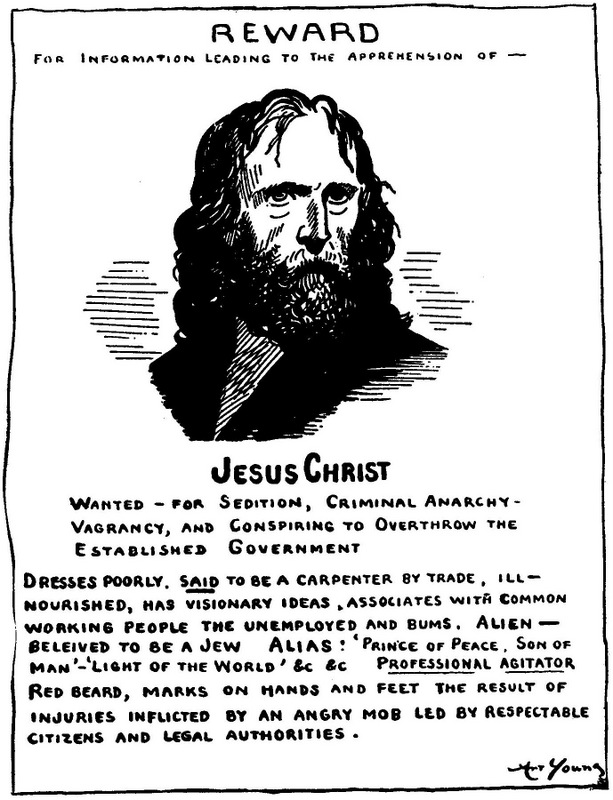
Jesus Wanted
Art Young, 1917
My dear friends,
The passage before us speaks of the great compassion of Christ, who, like a Bodhisattva, engages with the suffering of the world to liberate beings from bondage. Just as the Bodhisattva takes on the burden of samsara for the sake of all sentient beings, Jesus willingly assumes human form to break the chains of fear and death. This is the path of wisdom and compassion, the very essence of Bodhicitta, the awakening mind that seeks enlightenment for the benefit of all.
he himself likewise shared the same things,
so that through death he might destroy
the one who has the power of death,
that is, the devil,
and free those who all their lives
were held in slavery by the fear of death.
- Hebrews 2:14-15
Fear of death is one of the great delusions that bind sentient beings to suffering. In Buddhist teachings, clinging to the illusion of a permanent, independent self leads to endless cycles of birth and death. Christ, in his infinite compassion, takes on the suffering of mortality to show that death is not to be feared. Like a Bodhisattva who enters the burning house of samsara to lead beings to liberation, Christ dismantles the power of death by revealing its emptiness, freeing us from the illusions that enslave the mind.
- Hebrews 2:16
A true Bodhisattva does not remain in celestial realms, distant from suffering beings, but manifests where help is most needed. Christ’s incarnation among humanity reflects this same compassionate vow. He does not come for those who are already beyond suffering, but for those still caught in delusion. Just as the great Avalokiteshvara manifests in myriad forms to assist beings, Christ’s life is an offering of love directed toward those in the greatest need.
- Hebrews 2:17a
To guide beings to liberation, one must enter their suffering and understand it from within. In Buddhist tradition, the Bodhisattva does not remain apart from samsara but engages with it fully, skillfully leading others toward awakening. Christ’s willingness to become fully human exemplifies this same vow. He walks the human path, not as a distant teacher, but as a brother among us, sharing in our trials so that he might lead us beyond them.
to make a sacrifice of atonement for the sins of the people.
- Hebrews 2:17b
A Bodhisattva dedicates their life to the liberation of all beings, offering even their own body if it would bring benefit. Christ’s sacrifice is the supreme act of selflessness, not in appeasement of divine wrath, but as an expression of boundless compassion. In offering himself, he breaks the cycle of karma driven by ignorance and reveals the path of love and wisdom that leads to true liberation.
he is able to help those who are being tested.
- Hebrews 2:18
The Bodhisattva path is not one of detachment from suffering, but of engagement with it for the sake of others. Christ, having endured suffering, understands the struggles of those still caught in delusion and fear. Like the compassionate guide who has traversed the dangerous path and now returns to lead others safely, he offers his wisdom not from a place of distance, but from lived experience. In him, we find both refuge and the inspiration to walk the path ourselves.
In Christ’s incarnation, suffering, and ultimate victory over death, we see the very heart of the Bodhisattva vow—a life dedicated to the liberation of all. May we too take up this path, embodying the wisdom and compassion that leads all beings to freedom.